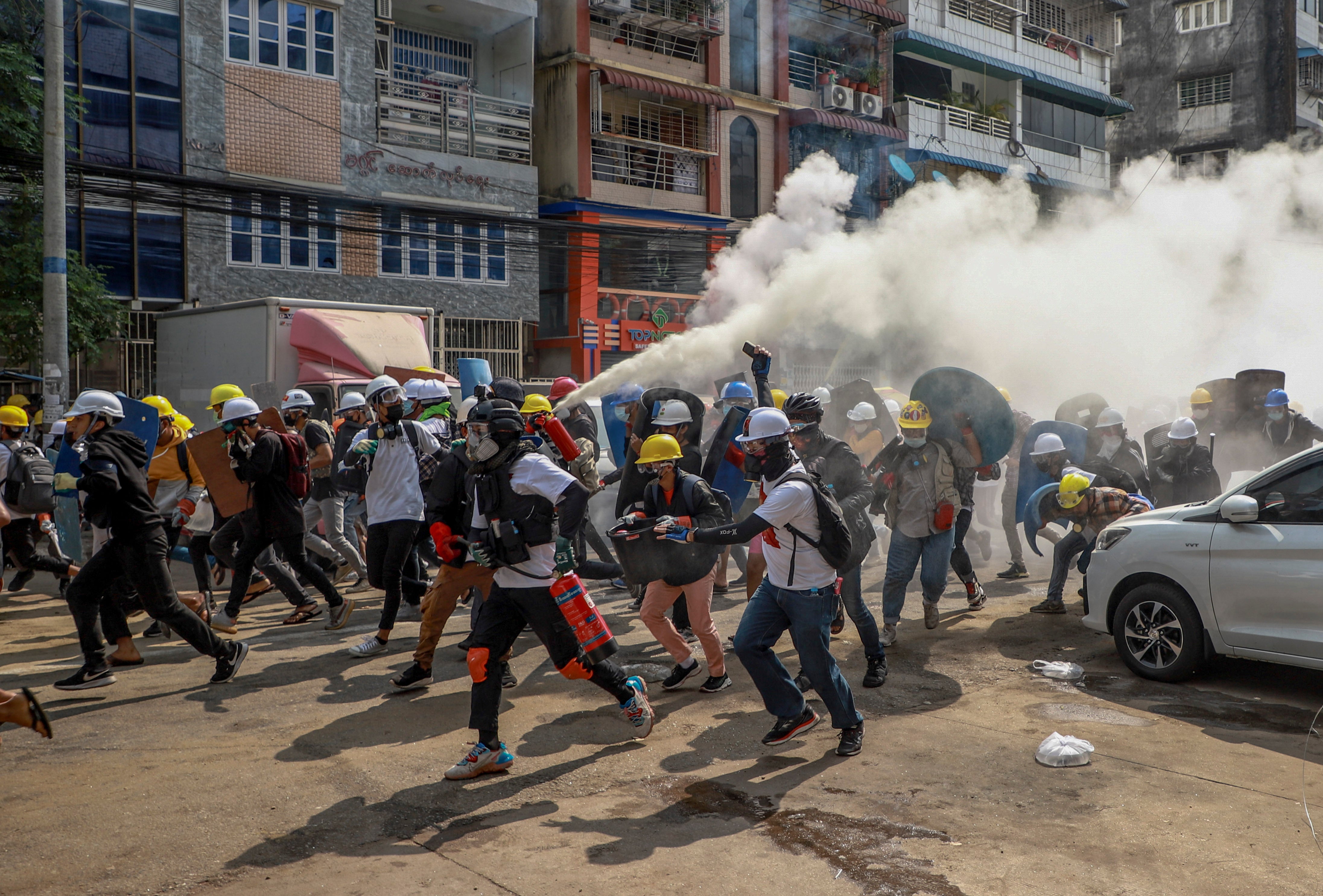Myanmar coup ‘darkness before a new dawn’, says daughter of top Aung San Suu Kyi aide
Exclusive: Chit Suu Win Htein was forced to flee weeks into the coup as growing numbers of activists were arrested. She tells Sara Perria how her father and other party leaders knew something was coming

The fightback against Myanmar’s military after last month’s coup is not just taking place on its streets.
Some are playing their part as keyboard warriors, while others coordinate and support action from boltholes in other countries.
One of the latter group is Chit Suu Win Htein, the daughter of one of Aung San Suu Kyi’s closest confidantes, U Win Htein. She fled the country as more and more people were being arrested, and now maintains a constant dialogue with minority ethnic groups in Myanmar from an undisclosed safe location.
Speaking to The Independent, she says many in Ms Suu Kyi’s party knew a coup was coming despite keeping up appearances of business-as-usual in public, and her father warned her to stay away after they last met on 27 January. The military took over just five days later.
“I wish Aung San Suu Kyi had made a statement during the [post-election] negotiations, so that people would not hear only rumours and the military,” she says now. “Some think she was arrogant, and that she should’ve negotiated.
“But it’s the same as when a girl gets raped and people say ‘why was she wearing that?’ … The military had no right to make demands and [if she conceded] they would have it all. And also, we don’t negotiate with terrorists,” she says, using the same term to describe the military as an increasing number of Burmese do on social media.
She has had no contact with her father, who is almost 80 and is ill, since they arrested him on 4 February. She tried to stay on in the country but decided to flee the country for the safety of her family, several weeks into the coup.
“I was angry, I wanted to stay with my father and they had no protection or security. I just couldn’t believe this would happen in 2021,” says Chit Suu Win Htein, who worked for an NGO backing the democratic transition that her father had, like Ms Suu Kyi herself, spent years longing for in prison.
But she admits that the reaction of ordinary people caught many by surprise, even her older friends who joined the 1988 uprising and, most of all, the military. “I really don’t think that they were expecting such a turnout because of Covid and the economic impact the pandemic already had,” she says.
Many in Myanmar hope the international community will intervene to support the protests and are left frustrated at what are often labelled as “empty statements” on Twitter.
Yet, the daughter of the NLD patron says the military was probably not expecting these levels of international pressure already shown. Partly because “nothing happened before”, but also because “now every citizen is a reporter and everything gets out to the world, bringing continuous attention to what’s happening,” she says.
In fact, the many people left unemployed by the conjuction of Covid and the coup have filled the ranks of the protest in different ways.
June Khine, an engineer in Yangon who had just come back from Singapore, is one of the people defining themselves as “keyboard warriors”, as opposed to the “frontliners” who go out to protest. “We mainly help to spread information and updates on the ground: if someone sees something fishy, they’ll let keyboard warriors know and we will spread the news as much as we can so people can decide if they should avoid or go to certain places.”
Artworks depicting scenes of the protests and their heroes are produced almost instantaneously and Generation Z is especially active in sharing videos, photos and adding translations for the international media, or even to the UN “to use as evidence”, June says.
People interviewed on social media are organizing groups managed by the Burmese diaspora as well, such as the newly founded Global Movement for Myanmar Democracy. They say that they don’t want to see a repeat of the 1988 revolution, when people had no way to let the world know what really happened, to the advantage of the junta.
Confirming what sources close to members of the military have told The Independent, Chit Suu Win Htein says that general Min Aung Hlaing does not have the full support of the military either.
“Some are seeing the generals proposing to destroy their own 2008 Constitution and wanting to change the electoral system.”
Security forces have seen a number of defections especially amongst the police. Even some senior military figures are against the newly-seated dictator, who is perceived as “acting only out of his own self interest,” sources told The Independent, asking not to disclose names.
Shedding a light on the mostly unintelligible and controversial relationship between the civilian and military government that survived five years of failed democratic transition and accusations of genocide, Chit Suu Win Htein describes the lack of trust on both sides.
“People never invited each other to casual meetings or to the respective weddings or ceremonies for example, which are a big deal for us since you invite everybody,” she says.
But she believes there’s an upside to the coup, as Myanmar becomes more inclusive against a common enemy and, crucially, will find “new leaders”.
“This is only the darkness before a new dawn,” she says.





Join our commenting forum
Join thought-provoking conversations, follow other Independent readers and see their replies
Comments